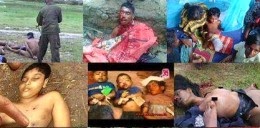A preview screening of the BBC World documentary ‘Sri Lanka’s unfinished war’, which outlines several cases of rape and torture against Tamils in the North-East, took place at the Frontline club today.
The screening was followed by a panel discussion with the producer of the documentary, Frances Harrison, producer of the No Fire Zone documentaries, Callum Macrae and policy and advocacy manager at Freedom from Torture, Sonya Sceats. The Sri Lankan High Commission to the UK refused an invitation to participate in the discussion.
The panel, chaired by a barrister at a London chamber who acted as a rapporteur to investigate the impeachment of Sri Lanka’s Chief Justice, Sadakat Kadri, discussed various issues and answered questions from the audience.
Full discussion can be viewed below.
Macrae outlined that the lack of credibility of any investigative initiative set up by the Sri Lanakan government,
“The Sri Lankan government has an endless history of commissions that have amounted to nothing. And I think we’re going to see a lot in the run up to the UN sessions in March. I think a spurious reconciliation commission will be offered with the unfortunate help of South Africa, which will be used as an excuse to prevent things form happen. I’m sorry but from what they’ve done in the past, we can guarantee that almost any investigation will be spurious.”
Speaking on David Cameron’s attendance of the Commonwealth Heads of Government meeting, Callum Macrae reiterated,
“Now we have to keep on the pressure, and make sure that what was started is continued.”
Commenting on the issue of deaths during the entire phase of the war, Frances Harrison, said,
“I think it’s an incredible positive thing if it can be done in a transparent and credible way. But for that to have any meaning in Sri Lanka, it would have to have some sort of international observer or involvement.”
Policy advisor for Freedom From Torture, Sonya Sceats, outlined that currently Sri Lanka was producing the most torture cases worldwide.
Regarding allegations that torture evidence were fabricated for asylum claims, Sceats said,
“Unfortunately this is a rumor that we hear a lot. To this day we have not seen a shred of evidence that supports this claim. The UK border agency finally agreed to remove that allegation after we challenged it, but unfortunately the rumour still circulates in the tribunal.”
“All of our doctors examining courses are required to consider if there is fabrication. We have produced over 120 reports of victims that were tortured in the aftermath of the conflict. This is a claim that has no basis.”
Responding to a question regarding the systematic nature of torture, Francis Harrison, outlined the need for an independent investigation into the torture and that there was enough investigation for the UK to investigate the cases and trace back accountability.
Callum Macrae went on to say,
“The nature of the sexual assaults, executions within such a disciplined army means you can trace the responsibility in command right to the very top.”
Concluding comments on the ongoing ethnic re-engineering and oppression in the North-East, Callum said,
“The continued failure of the international community to provide justice for the Tamils could result in another armed conflict.”
